Editor’s note: Here in the United States, discussions about theology, particularly about what the Bible says about women, about marriage, and equality, can get heated. But many times, sincere people come to different conclusions and “agree to disagree.”
In part, that is because women in the west, even those in “traditional” hierarchical marriages, are mostly treated kindly and fairly. They’re seen as persons, and if abuse happens, it is not condoned or accepted by society at large. Even when both partners agree that the man is the “spiritual leader” and makes final decisions, these marriages are most often respectful and in practice, rather egalitarian. A man in the west, even if he believes his wife should always submit to him, would never, for example, have six wives, and make them all work while he sat at home relaxing. He would not consider his wife his “property” even if he considers himself the final decision maker in his home.
In Malawi, however, “normal” is quite different. When a man marries, he pays a “bride price” for his wife. That price (paid in money, animals, etc.), it is understood, makes her his property, and in return for that price, she is supposed to do work, provide sex, and bear children. Wealthier men have several wives so that they don’t have to do any work—the women do it all and cannot complain or leave.
Also, in rural southern Malawi, many elements of traditional religion persist and is even accepted by the leaders of the Christian churches. One particularly heinous practice is that of parents paying a “hyena”—a man in the village—to sneak into their houses at night to rape their young daughters to remove the “dust of virginity” from them. The hyena is also called upon to have sex with widows to “cleanse” them after the death of their husbands. The women, understandably, hate these practices but believe they must go along with them because local people believe that if they don’t do it, the entire village will perish. Even pastors support it because of the strength of local superstition. Changing this tradition is difficult (see this report from CNN).
When we are able to present the truth of the Bible and what it says about mutuality and respect, and how that is based on the Bible, people don’t just change their minds theologically. They change their actions in a radical way that saves lives and prevents abuse. But it requires great courage to stand against the culture, which is based on fear that not “pleasing” their ancestors could result in the complete destruction of their entire village.
What is truly amazing is that when Empower Minister Sally Bryant was in Malawi earlier this summer, several pastors (even those who go along with the “hyena” tradition) requested that we bring the program to their villages.
We’re incredibly thankful for Pastor Arnold Phiri, who took the New Man, New woman, New Life seminar to Nsanje to conduct two seminars at churches. Arnold felt that the extreme hot weather and mosquito season would be too much for our team, so he offered to go himself.
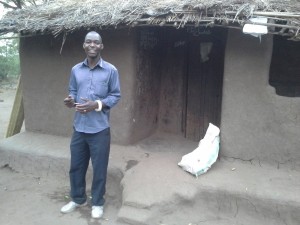
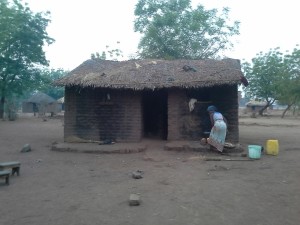
When the idea for equality and its Biblical support is presented in the New Man, New Woman, New Life seminar, which Arnold led, debate gets heated. But in this case, many of the participants changed their minds about the issue.
Here is an edited version of Arnold’s report:
The distance from Blantyre to Nsanje is 220 kilometers. I started my journey at 11 am by road and I was in Nsanje around 5 PM.
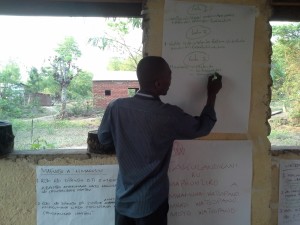
The seminars took place in two places: at Marka and T/A (Traditional Authority) Chimombo.
The first seminar, at Chimombo, was attended by 40 elders.
When I presented the lessons people were amazed and there was a debate about the curse because women were confessing that they are cursed. They also feel cursed because of what they are being subjected to. But at the end they were convinced that they are not cursed.
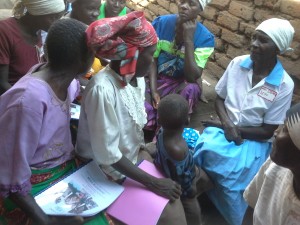
Also the equality men and women it was a hot debate because when the man pays the bride price, the woman is like the man’s property. Hearing that men and women are equal and both were created by God, it was good news to them.
And after this it was easy for the people to be in small groups and being mixed. At first they were in separate groups, because they don’t usually allow groups of men and women to mix. But after hearing about equality, they met in mixed groups.
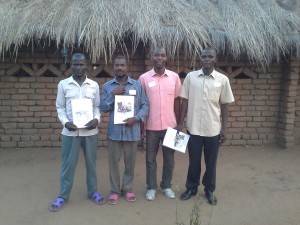
At Marka, which is located on the border between Malawi and Mozambique, I had 37 participants.
I have learned a lot about local culture and how women are treated. For example, when a woman is pregnant, on the day of delivery the man builds a bathroom for her, a special one just for her because she cannot use the bathroom with others.
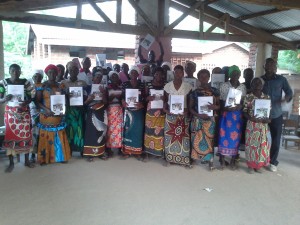
Also when she returns from giving birth, she is considered “unclean.” So when she moves around the house, especially near her husband, she should not make noise with her foot steps because the local people believe making noise or disturbing him would transfer the diseases (uncleanness) to her husband. (Even Christians are impacted by this fearful superstition.)
Many of the men marry many wives so that they can be working while the man just stays at home. One village headman has six wives. They all work in the fields while the man does little to nothing.
These people do all these things because they want to please the spirit of their ancestors. They believe their ancestors, if angered, will cause destruction. One thing they do to placate their ancestors is to have human “hyenas”—men who rape young girls and widows to “cleanse” them (see our article about this horrific practice here). The women complain a lot but eventually they submit to the hyena because they are sincerely afraid that if they will not do it, the whole village will perish.
Also when a woman’s husband has died, after the burial, the relatives of the husband finds a hyena so that he can have sex with the widow for “cleansing” because during the funeral people don’t do sex and if this can not happen the village will perish. The women have no choice because they are in the hands of the husband’s relatives, because they paid bride price. Her relatives have nothing to say.
And also when the girls are growing (and reach puberty), their families believe they should break the virginity. So there also hyenas who do that and the girls have no choice but to follow that, its like its everybody, that’s why they go for early marriages. These hyenas get paid—it’s a secret when you go around you might think everything is well but some thing is wrong.
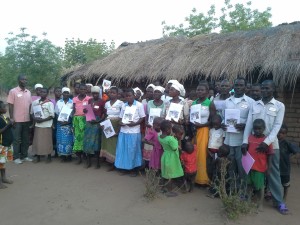
When I finished my class I met one village headman and I talked to him about the materials I was teaching. He was amazed. He said this is great, because the NGO’s has been coming here but they have failed us, things are not changing. They are distributing condoms to the people, he said, but you have brought the word of change, which starts inside. If you look around there are condoms everywhere, and there is the problem of early marriages in these areas.
It was very hot and mosquitos everywhere the Lord helped me and am back home safely.
Be blessed,
Arnold
